Why can't Mars colonists have sex with Earthlings? Scientists have described the evolution of immigrants
Categories: Health and Medicine | Science | Space | World
By Pictolic https://pictolic.com/article/why-cant-mars-colonists-have-sex-with-earthlings-scientists-have-described-the-evolution-of-immigrants.htmlIf Martians do not exist, then sooner or later they will definitely appear — so says physics professor Brian Cox (Brian Edward Cox) from University of Manchester. He is sure that people who have settled on the Red Planet will eventually become strikingly different from their earthly counterparts due to special living conditions.
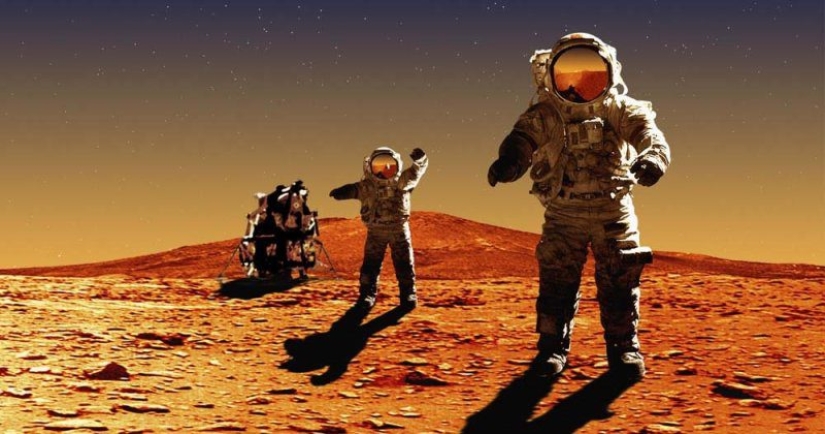
The owner of SpaceX, Elon Musk, has long been fired up by the idea of colonizing Mars. He already has the main thing — the project of ITS or Interplanetary Transport System, a transport system that allows you to establish regular communication with our neighbor in the Solar System.
Spaceships, according to Musk's plan, should cruise between Earth and Mars at intervals of 26 months, which will increase the number of colonists to 1 million by 2070. Paul Davis, a professor at the University of Arizona, and one of the most authoritative researchers on the issue, is confident that only Mars, which has a protective atmosphere, reserves of water, carbon dioxide and methane, can become a second home for humanity.
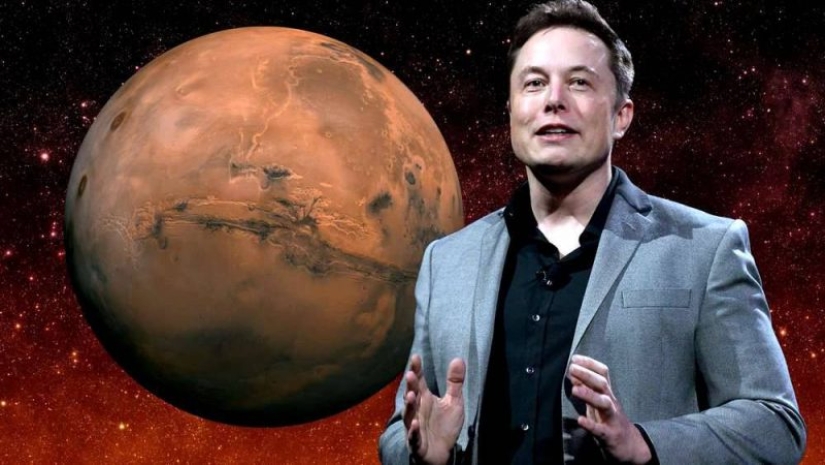
One of the first ideas to settle on Buzz Aldrin, an astronaut who became the second man to land on the moon, began to preach to Mars. Unexpectedly, there were not so few people willing to change their place of residence — today the list of volunteers has more than 300 thousand people.
Of course, having settled on another planet, where the living conditions are strikingly different from those on earth, a person will inevitably begin to adapt over time. The body and even the physiology of Homo sapiens will undergo changes — the colonists will lose something, and on the contrary, they will gain something.
Researchers are confident that the main changes will occur in the human skeleton, due to the fact that the gravity force on the Red Planet is three times lower than Earth's. Bones will begin to melt at a rate of about 2 percent per month and in a couple of years no more than half of the bone mass will remain.
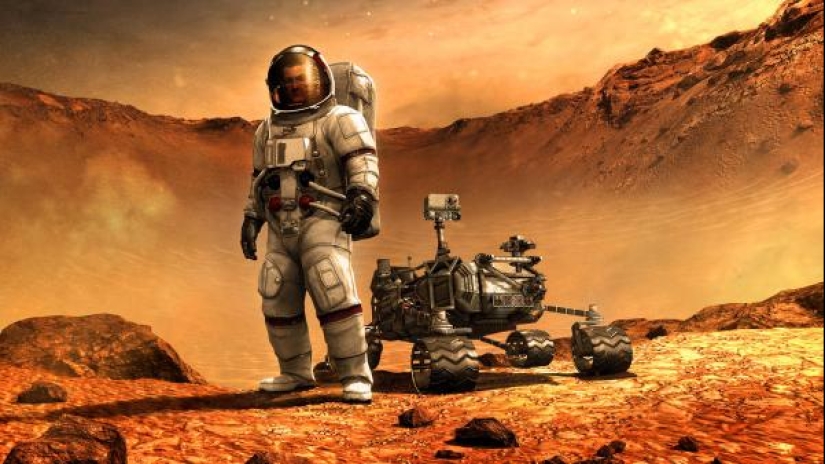
Such changes will entail serious consequences — the newly minted Martians will become particularly vulnerable to fractures. But the body will react to the problem and the bone tissue will begin to condense and become like the distant prehistoric ancestors of man. The changes will be fixed genetically and each next generation will become more stocky.
In order to better absorb the oxygen that the Martians will produce themselves, people will have enlarged lungs, and hence their chests. Lower illumination than on Earth, due to greater distance from the Sun, will lead to an increase in the eyes and an increase in the ability to see in the dark.
The proportions of the body will change significantly, according to paleoanthropologist Matthew Skinner from the University of Kent. The need to hold on to surrounding objects due to the low gravity will lengthen the hands of Martians, and the big toe is likely to become detached from others, like orangutans.
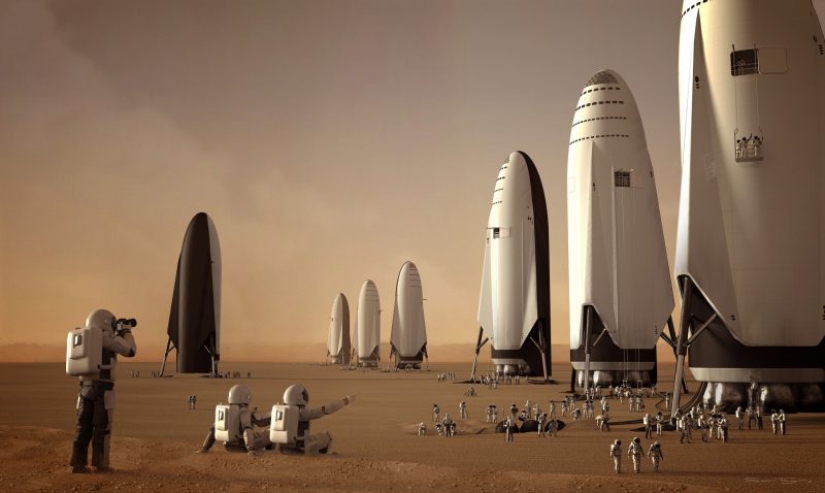
In addition to poor lighting and weak gravity, migrants are also waiting for more serious, deadly problems. The most serious of them is radiation. People will not always be able to stay in the bowels of the planet or under the protection of special buildings — they will have to move on the surface of Mars, doing research, construction, mining.
In this case, scientists warn that within 500 days the dose of radioactive radiation will be 6 times higher than the permissible for workers of terrestrial nuclear power plants. Radiation will affect not only a person's health, but also his DNA. New generations of Martian people will become more susceptible to oncological diseases, but at the same time they will teach a lot of useful for life on Mars genetic changes.
The need to protect yourself from harsh radiation will lead to increased production of the pigment melanin or an even darker variant — eumelanin. The inhabitants of the planet will become not just swarthy, but black, darker than the inhabitants of the equatorial regions of Africa. It is possible that over time such a tan will be replaced by innate redness, thanks to carotenoids — orange pigments that perfectly protect from solar radiation.
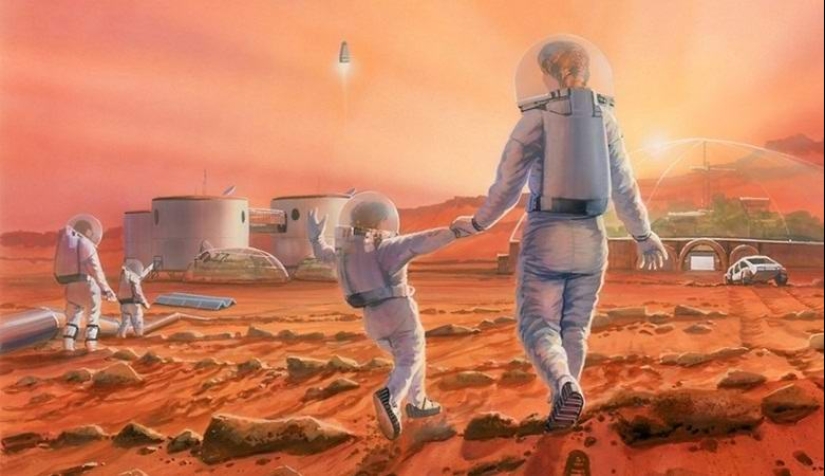
On Mars, a person will not have the usual terrestrial neighbors — microbes that surround us all our lives and help digest food, strengthen the immune system and optimize metabolic processes. So far, no microorganisms have been found on the Red Planet, and terrestrial ones are unlikely to last long. This means that colonists risk becoming sterile, which will negatively affect immunity and digestion.
In laboratory conditions, scientists have determined what such forced disinfection is fraught with. Mice that lived without a microbiome suffered from diabetes, asthma, and various forms of allergies. They did not absorb nutrients from food well, and their nervous system did not develop fast enough.
People will suffer from a lack of microflora for some time, perhaps supporting themselves with special drugs, but evolution will solve this problem. Bacteria will be able to adapt to new conditions and, mutating due to radiation, get the necessary for life on Mars features.

There are problems with the survival of microorganisms and another point — the inhabitants of the Martian colonies will not know what infectious diseases are. This is a "double-edged sword", which also has negative aspects. The human body, ceasing to encounter pathogenic organisms, will lose immunity.
In this situation, communication with new settlers arriving from Earth will pose a serious threat. Bacteria that previously caused only discomfort and were relatively easily destroyed by antibiotics will become deadly. Sex with earthlings will be impossible, since even banal chlamydia will turn into a deadly disease that can destroy the entire colony.
Professor Scott Salomon, who studies the theory of human evolution at He believes that it will take at least 6 thousand years or about 100 new generations for the final completion of the transformations that turned the colonists into the indigenous inhabitants of the Red Planet.
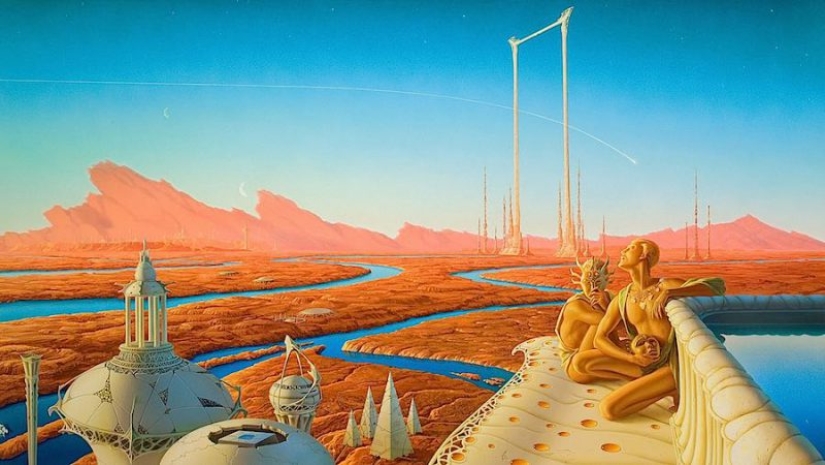
Not so long ago, a scientific article was published in which Brazilian and Polish scientists shared a bold forecast about changes in the social and social life of the colonists. According to researchers, in order to survive in the harsh conditions of another planet, the first generations of earthlings will have to show maximum firmness and even rational cruelty.
In order to preserve the mind and the human species, the settlers will have to get rid of offspring with abnormalities and mutations. In order to exclude the birth of children with genetic defects, women expecting offspring will have to be registered for genetic registration in the first days of pregnancy.
Alas, people with fatal diseases and irreparable injuries will also have no place among the settlers. If on Earth we can support the life of patients for months or even years, then on Mars will inevitably have to get rid of such members of society.
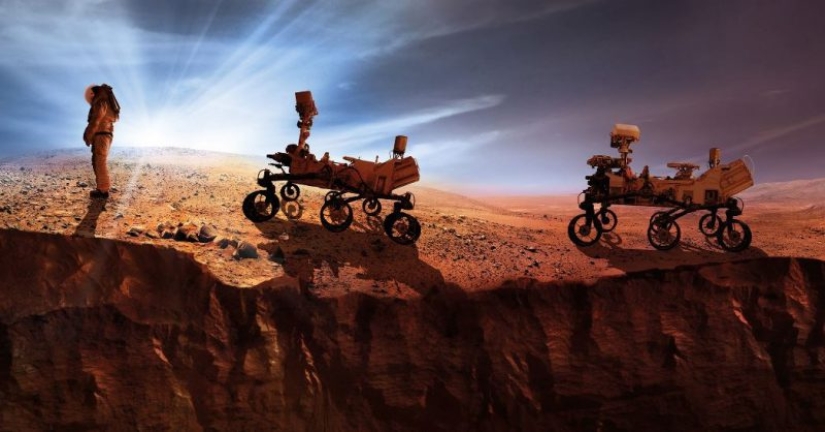
The ideas of humanism will suffer for the sake of the triumph of collective interests, but this will not lead to the degradation of society, as it will be typical only for the first ten generations of Martians. After a while, when life on the planet gets better and becomes less harsh, society will differ little from what we are used to seeing on Earth.
To speed up the processes of adaptation of colonists on Mars, scientists offer various unexpected solutions. For example, at the London Innovation summit (Codex innovation summit), it was proposed to send genetically modified people to colonize another planet in advance.
This idea was proposed by Dr. Douglas Terrier, NASA's chief technologist. Having made changes in human DNA in advance, Dr. Terrier suggests protecting the pioneers from the cruel radiation on the way in the first years of life on Mars, while adaptation will take place and infrastructure will be created.
In the meantime, earthlings are rehearsing the colonization of the Red Planet on their native Land, looking for the most severe corners of it for maximum realism and artificially creating additional problems and hardships for themselves.
Recent articles

It's high time to admit that this whole hipster idea has gone too far. The concept has become so popular that even restaurants have ...

There is a perception that people only use 10% of their brain potential. But the heroes of our review, apparently, found a way to ...

New Year's is a time to surprise and delight loved ones not only with gifts but also with a unique presentation of the holiday ...